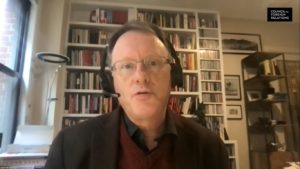
China’s economy is dealing with some tough years, writes leading economist Arthur Kroeber, author of China’s Economy: What Everyone Needs to Know®, in ChinaFile, especially now that it does not have enough tools with debts and the property crisis like it did in the past. “So we need to brace for the consequences of the Xi model: slower growth in China, a big rise in Chinese technology exports, and more protectionism in the rest of the world,” he writes.
Arthur Kroeber:
China’s economic malaise results from a combination of political decisions, structural factors, and policy mistakes. The central reason for it is that Xi Jinping has decided to make national security and technological upgrading—not economic growth—his policy priorities.
The broadening definition of national security, and the increased influence of security interests in economic policy, have soured private investor confidence. The focus on technological upgrading has led to an economic strategy that relies almost exclusively on industrial policy. This means that the government devotes most of its attention to the supply side of the economy: boosting production of semiconductors, clean energy equipment, electric vehicles, industrial machinery, ships, and other products seen as needed to increase the country’s technological capability and self-sufficiency. Virtually no serious effort goes into figuring out how to unlock domestic demand—especially from households, which now save about a third of their income, one of the highest savings rates in the world.
These policies mean that China’s economy will have two faces in the coming years. The chronic shortage of demand will mean disappointing GDP growth—probably 3-4 percent on average over the rest of the decade—and a constant struggle to shake off deflation. But at the same time, its technology-intensive sectors will thrive, thanks to both government support and China’s uniquely competitive manufacturing ecosystem. The result will be persistent high trade surpluses and, probably, a strong wave of protectionism from countries that want to preserve their own industrial capacity.
This policy stance also makes it very hard for China to solve two of its biggest structural problems: the collapsing property market and the huge and growing debt burdens of local governments. The last time China faced a challenge of this scale was the late 1990s, when nearly half of all bank loans went bad. At that time, it responded with a combination of financial engineering to postpone the reckoning of bad debts, well-targeted infrastructure stimulus, and aggressive deregulation of manufacturing and housing which unlocked huge new sources of entrepreneurship and household demand. As a result, China grew out of its problems and by 2010 became the world’s second-biggest economy.
A similar approach today would recognize that deregulation of services—which account for more than half the economy, and all net new employment—is the main path to boosting consumer demand and accelerating economic growth. Too much of the service economy is either in state hands, or burdened by stunting regulations. But such a policy would conflict directly with Xi’s desire to keep the state’s finger on all economic levers. So we need to brace for the consequences of the Xi model: slower growth in China, a big rise in Chinese technology exports, and more protectionism in the rest of the world.
More views of other economists in ChinaFile.
Arthur Kroeber is a speaker at the China Speakers Bureau. Do you need him at your meeting or conference? Do get in touch or fill in our speakers’ request form.
Are you looking for more financial experts at the China Speakers Bureau? Do check out this list.